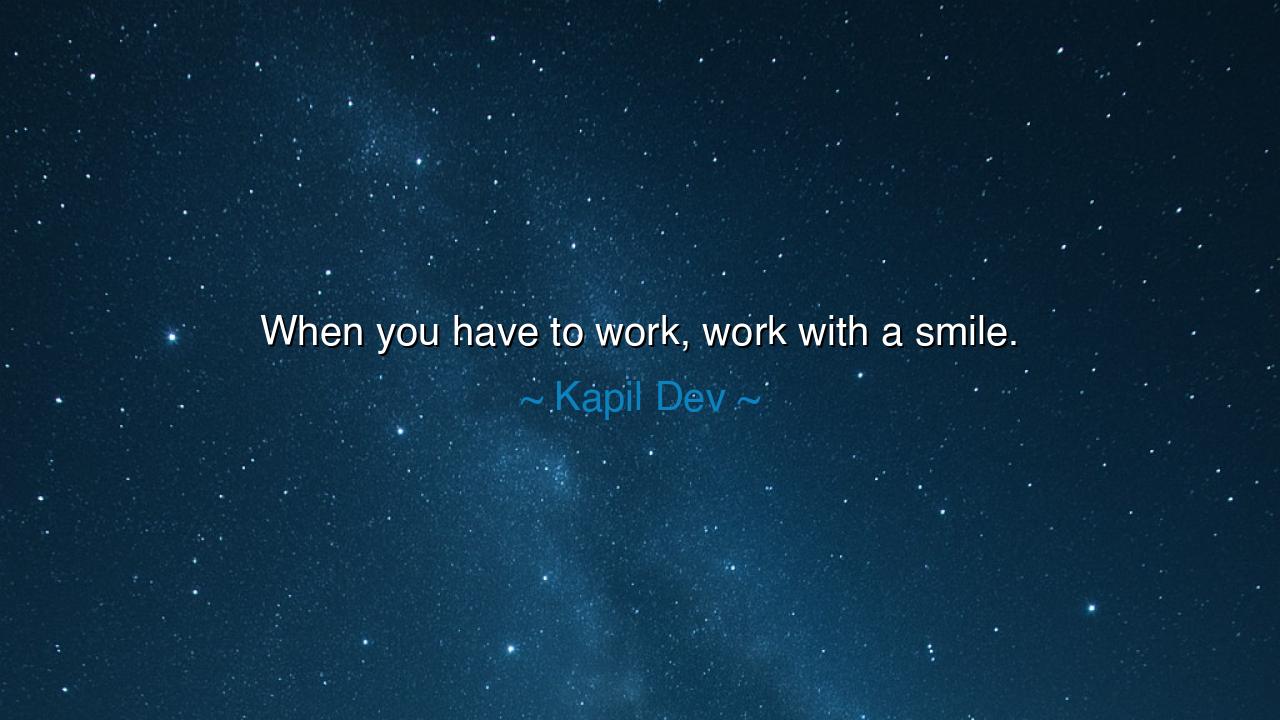
When you have to work, work with a smile.






Hear now the words of Kapil Dev, the great cricketer and captain who lifted the spirits of a nation: “When you have to work, work with a smile.” At first these words may appear simple, even ordinary, but within them lies a truth as eternal as the sun’s rising: that labor is not merely a burden to be endured, but a sacred act to be embraced with joy. For to smile as one works is to transform toil into triumph, duty into delight, and necessity into a song of the heart.
The ancients knew well the weight of labor. Farmers bent beneath the plough, builders laid stone upon stone, artisans carved beauty from rough wood and marble. Many saw only hardship. Yet the wise among them discovered that attitude is the secret alchemy of the soul. The same task that crushes one man can exalt another, if the latter approaches it with light upon his face. Kapil Dev reminds us of this ancient wisdom: the smile is not decoration—it is strength, it is endurance, it is the spirit’s defiance against weariness.
Think of Kapil himself, leading India in 1983 to their first World Cup victory. The odds were against them; the rivals were stronger, the world doubted. Yet he played not with bitterness nor dread, but with joy—the kind of joy that comes when one gives everything with courage and faith. His innings of 175 against Zimbabwe, played with a fearless grin, became not just a match-winning moment, but a symbol of what it means to work with a smile: to give all that is required, while refusing to let hardship steal one’s spirit.
History too offers echoes of this truth. Recall the builders of the Great Wall of China, who labored for generations under harsh conditions. Legends tell that many sang songs as they worked, lifting one another’s spirits even as their bodies ached. Their songs were their smiles, their resistance against despair. The stones they laid became a monument, not only of defense, but of human perseverance, born of labor endured with courage and, yes, sometimes with joy.
The meaning of Kapil’s words is not that work will always be easy, nor that a smile erases hardship. Rather, it is that the spirit is greater than the task. A bitter heart makes even light work heavy, but a joyful spirit makes even heavy burdens bearable. To smile is to claim mastery over your labor, to declare that your soul will not be broken by necessity.
The lesson, then, is for all who toil in fields, in workshops, in offices, or in homes: when work must be done, do it with gladness. Let the smile upon your face transform the atmosphere around you. Let it lift not only your own heart but the hearts of those who labor beside you. For joy, like fire, spreads when kindled, and one smiling worker may light an entire company with hope.
So, beloved, make this your practice: rise each day and greet your work not as an enemy, but as a companion on the road to purpose. Begin with gratitude, carry yourself with a smile, and end with the satisfaction that you have given your best. In this way, even the most ordinary tasks become holy, even the smallest labors become heroic. And generations after, others will say of you: here was one who worked not in bitterness, but with the joy of a shining heart.






AAdministratorAdministrator
Welcome, honored guests. Please leave a comment, we will respond soon